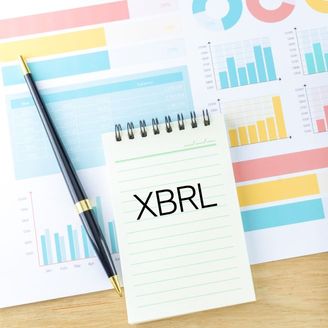XBRL Filing in Singapore: Requirements, Deadlines and Format
- Modified: 26 December 2024
- 10 min read
- Bookkeeping


Gabi Bellairs-Lombard
Author
Gabi's passionate about creating content that inspires. Her work history lies in writing compelling website copy and content, and now specialises in product marketing copy. When writing content, Gabi's priority is ensuring that the words impact the readers. As the voice of Osome's products and features, Gabi makes complex business finance and accounting topics easy to understand for small business owners.

Kelly Yik
Reviewer
Kelly Yik, our Accounting Team Lead based in Singapore, ensures that the team meets quality standards and follows accounting standards (SFRS) while remaining compliant with all the authorities' rules and regulations in Singapore. With six years of experience in Singapore accounting, she knows the ins and outs of financial reporting standards, GST, and corporate tax like nobody's business. Kelly supports our blog writers by carefully reviewing our content, making sure it's accurate, up-to-date, and packed with helpful tips for Singapore businesses. So, you can trust the info you get on our blog is not only interesting but also reliable!
Navigating the world of financial reporting can be challenging, especially when it comes to eXtensible Business Reporting Language (XBRL) filing in Singapore. This blog post will guide you through the essential aspects of XBRL filing, from understanding its purpose to exploring the various filing formats and requirements mandated by the Accounting and Corporate Regulatory Authority (ACRA). By the end, you’ll have a comprehensive understanding of how to ensure your company’s financial data is accurately and efficiently reported.
Key Takeaways
- XBRL filing is a standardised language used to exchange financial data between companies and regulators in Singapore.
- Incorporated companies are required to file their financial statements with ACRA, while some may qualify as exempt from XBRL filing requirements.
- Companies must prepare documents for Full XBRL Financial Reporting or use the Simplified XBRL template, depending on size. Outsourcing this admin task is worth it but should be considered carefully.
What Is XBRL Filing?
XBRL, or eXtensible Business Reporting Language, is a standardised language used for exchanging financial data between companies and regulators. In Singapore, ACRA enforces the revised XBRL filing requirements, holding company directors accountable for accurate financial statement submissions. Since November 1, 2007, all incorporated companies in Singapore, with few exceptions, must file their financial statements in XBRL format with ACRA.
The adoption of XBRL format (XBRL FS) simplifies financial reporting and analysis for both companies and regulators. It allows for the efficient exchange of financial information, providing a common platform for data comparison and evaluation. This streamlined process increases transparency and compliance with Singapore financial reporting standards (SFRS). Companies often seek professional accounting services to ensure they meet these XBRL filing requirements accurately and efficiently.
XBRL Filing Requirements in Singapore
The Corporate Regulatory Authority (ACRA) is key in implementing and enforcing XBRL filing requirements in Singapore. Companies operating within the country must adhere to these financial report filing requirements, whether limited or unlimited by shares.
We will now examine the specific requirements for different types of companies and the financial statements required to be filed in XBRL format.
Who needs to file financial statements in XBRL format?
All incorporated companies in Singapore, barring specific exemptions, must file their XBRL financial statements with ACRA in this format. This requirement has been in force since November 1, 2007, ensuring that financial data is consistently reported and easily accessible for regulators, investors, and other stakeholders.
Non-compliance with XBRL filing requirements may lead to penalties under Section 197 of the Companies Act, such as late filing fees ranging from $300 to $500, based on the severity of the breach. Additionally, companies and directors convicted of three or more filing offences within a five-year period may be disqualified from directorship.
Who is exempt from XBRL filing requirements?
Exemptions from XBRL filing aim to alleviate the burden for certain types of businesses, such as dormant companies and solvent Exempt Private Companies (EPCs). To qualify for the exemption, a company must fulfil the conditions specified in Section 201A of the Companies Act and meet the criteria for being a dormant company, meaning it does not generate any income or is not actively trading.
Keep in mind that not all companies qualify for these exemptions. Directors should confirm that their company meets the exemption criteria to prevent penalties for non-compliance with XBRL format.
What financial statements must be filed in XBRL format?
ACRA mandates that specific financial statements be filed in XBRL format, which includes the following:
- Balance sheet
- Income statement
- Cash flow statement
- Statement of changes in equity
These statements, also known as financial statement highlights, are essential components of any company’s financial reporting, accurately representing the company’s financial performance and position. By examining the financial statements highlights, stakeholders can gain valuable insights into the company’s overall health.
Filing the company's financial statements in XBRL format ensures that the data is easily accessible and comparable for regulators, investors, and other stakeholders. This standardised format contributes to greater transparency and compliance with SFRS.
When is the XBRL filing deadline?
The XBRL filing deadline in Singapore varies according to the type of company. For listed companies, the deadline is within five months, while non-listed companies have a 7-month deadline. Failure to meet these deadlines can result in penalties, including late filing fees ranging from $300 to $500, depending on the severity of the breach.
Companies can apply for an extension to the XBRL filing deadline by following these steps:
- Log into ACRA’s online VCC registration and filing Portal.
- Select ‘Extension of Time’ under ‘eServices’.
- Submit the application.
- The application may take up to 14 working days to process, so it is advised to plan accordingly to avoid potential penalties.

Types of XBRL Filing Formats
ACRA provides four distinct XBRL filing formats to accommodate the varying needs of different companies and industries: Full XBRL, Simplified XBRL, XBRL FSH for Banks, and XBRL FSH for Insurance.
We will now examine the specifics of each XBRL format and their respective use cases.
Full XBRL
The Full XBRL template is designed for companies that need to file their financial statements according to basic XBRL properties, including primary statements and selected notes to the financial statements. This comprehensive template comprises around 210 data elements, clearly representing a company’s financial performance and position.
Full XBRL filing allows companies to:
- Upload data from their primary statements and selected notes
- Ensure precise reporting of their financial data
- Make the data easily accessible for regulators, investors, and others.
Simplified XBRL
The Simplified XBRL template caters to smaller businesses and non-publicly traded companies in Singapore. It offers the following features:
- Approximately 120 data elements
- A more streamlined option for companies that need to file key financial data in XBRL format
- A full set of financial statements in PDF format
Utilising the Simplified XBRL template offers flexibility when business owners need to file financial statements and capture comprehensive information in financial performance and position statements. This format allows smaller and non-publicly accountable companies to file their financial statements in a simplified manner, saving time and resources.
If you’re a small business or non-publicly traded company, consider using the Simplified XBRL template. It’s a time-saving option that focuses on key financial data while still allowing you to submit a full set of financial statements in PDF format. This approach balances simplicity and compliance effectively.
XBRL FSH for banks
XBRL FSH for banks is an XBRL filing format specifically tailored for banks in Singapore, containing approximately 80 data elements for filing. This format is designed to meet banks' unique reporting requirements and provide a standardised and accessible presentation of their financial data.
XBRL FSH for banks in filing financial statements provides several advantages, including:
- Structured and controlled financial data
- Simplified data aggregation
- Cost-effectiveness
- Compliance with regulatory requirements
- Improved understanding of performance and risk
XBRL FSH for insurance
The XBRL FSH for insurance is designed to enhance business reporting for insurance companies by providing a template consisting of approximately 80 data elements. This format captures the entire information in financial performance and position statements, making it effortless for insurance companies to report their business information precisely and expeditiously.
Using the XBRL FSH for insurance offers the following benefits:
- Helps insurance companies comply with regulatory requirements
- Presents financial data in a standardised format
- Makes it easy to compare and analyse financial data by regulators, investors, and others — crucial for a stress-free way of filing financial statements
| XBRL Format | Purpose | Key Features | Benefits |
| Full XBRL | For detailed financial reporting by companies. | Covers ~210 data elements, including notes. | Ensures precise reporting and accessibility. |
| Simplified XBRL | For smaller businesses in Singapore. | Includes ~120 data elements and a PDF option. | Saves time and captures essential information. |
| XBRL FSH for Banks | For banks to meet regulatory needs. | Contains ~80 data elements. | Simplifies compliance and performance analysis. |
| XBRL FSH for Insurance | For insurance companies' financial reporting. | Covers ~80 data elements. | Eases compliance and standardises presentation. |
Steps for XBRL Filing Singapore
XBRL filing in Singapore follows a step-by-step process that includes preparing the financial statements in XBRL format using the BizFinx preparation tool and submitting the documents via the FS Manager. This process ensures that companies comply with ACRA’s XBRL filing requirements and that their data is accurately reported.
The BizFinx preparation tool is a free application provided by ACRA that helps companies prepare their financial statements in XBRL format. By following the workflow provided, companies (including foreign companies) can complete the fields in the XBRL templates for income statements and other financial statements. Once the financial statements are prepared in XBRL format, companies can submit these documents using the FS Manager, a web-based application that allows for submitting XBRL financial statements to ACRA.
Following this step-by-step process ensures accurate reporting of financial data and compliance with Singapore’s XBRL filing requirements. It also allows for efficient financial reporting and easy access to financial information for all relevant parties.
Documents for Full XBRL Financial Reporting
For Full XBRL reporting, companies must prepare specific documents, including:
- Balance sheet
- Auditor’s reports
- Income statement
- Cash flow statement
- Director’s report
These documents comprehensively represent the company’s financial performance and position, ensuring accurate and compliant data submission.
To prepare financial statements for Full XBRL reporting, companies must follow these steps:
- Map the line items in their financial statements to the relevant concepts within the ACRA Taxonomy
- Download the free BizFinx preparation tool from ACRA’s website
- Follow the provided workflow to complete the fields in the XBRL templates for income statements and other financial statements
Preparing these documents for Full XBRL reporting ensures:
- Accurate reporting of financial data
- Accessibility for all relevant parties
- Standardised format that enhances transparency and compliance with Singapore financial reporting standards.
Before beginning your Full XBRL preparation, review your financial statements for completeness and accuracy. Resolving discrepancies or missing data at this stage will make mapping to the ACRA Taxonomy more efficient and reduce the risk of delays during submission.
Outsourcing XBRL Filing: Pros and Cons
Outsourcing XBRL filing refers to the practice of engaging a third-party provider or using reliable accounting software to manage the preparation and submission of financial statements in XBRL format. This approach can be beneficial in terms of saving time and resources, with fees varying based on the provider and service level. However, outsourcing may also have some drawbacks, such as a lack of control over the process, the potential for errors, and additional costs.
The benefits of outsourcing XBRL filing include:
- Decrease in workload
- Cost-effectiveness
- Access to XBRL experts
- Ability to focus on core activities
- Decrease in expenses
By using a third-party provider, foreign companies can alleviate the burden of XBRL filing and ensure compliance with Singapore’s regulatory requirements.
Before outsourcing XBRL filing, companies should consider the advantages and disadvantages along with their specific needs and resources. This will help them decide what best suits their business and ensure accurate and compliant reporting.
Summary
In conclusion, understanding and complying with XBRL filing requirements in Singapore is essential for companies to ensure accurate and transparent reporting. By exploring the various filing formats, such as Full XBRL, Simplified XBRL, and XBRL FSH for banks and insurance companies, businesses can select the most suitable option for their needs. Following the step-by-step process for XBRL filing, companies can guarantee that their financial data is accurately reported and easily accessible to regulators, investors, and other stakeholders. Whether choosing to outsource XBRL filing or handle it in-house, companies must carefully consider the pros and cons to make the best decision for their organisation.
FAQ
What is XBRL filing?
XBRL stands for eXtensible Business Reporting Language and is a language used for the electronic communication of business and financial data worldwide. Adopted by ACRA, XBRL filing requires tagging each item of information with a unique identifier from the prescribed tag library. This facilitates the comparison of financial data across different companies and industries and enables more efficient analysis and processing of data.
Is XBRL filing mandatory in Singapore?
XBRL filing is mandatory in Singapore for all companies, with listed companies having a five-month deadline and non-listed companies a seven-month deadline.
What is the timeline for XBRL filing?
Companies in Singapore must prepare their financial statements in XBRL within five months for listed companies and seven months for non-listed companies after the end of the financial year.
How do I prepare an XBRL file?
To prepare an XBRL file, companies should use specialised XBRL software or tools that comply with Singapore's regulatory requirements. These software solutions enable the conversion of financial statements into XBRL format by applying the appropriate taxonomy. The process involves mapping financial data to standardised XBRL tags, ensuring accuracy and consistency. Companies must also adhere to ACRA's prescribed taxonomies and templates, which define how financial data should be tagged in XBRL.
How do I save an XBRL file?
After preparing the XBRL file using compliant software or tools, it should be saved in the required format, which is typically an ".xbrl" file extension. The XBRL file contains structured financial data tagged according to ACRA's taxonomy. Saving the file in the correct format ensures that it can be accurately submitted to ACRA during the filing process. Additionally, it's important to keep a copy of the XBRL file for record-keeping and compliance purposes.
When do I file XBRL?
The timing for XBRL filing in Singapore is determined by the company's Annual General Meeting (AGM) date. Companies are required to file their XBRL financial statements within 60 days from the AGM date. This means that the specific filing deadline varies from one company to another based on when their AGM is held. It's essential for companies to calculate their filing deadline based on their AGM date and ensure timely submission to ACRA to comply with regulatory requirements.
More like this
Get expert tips and business insights
By clicking, you agree to our Terms & Conditions,Privacy and Data Protection Policy
We’re using cookies! What does it mean?






